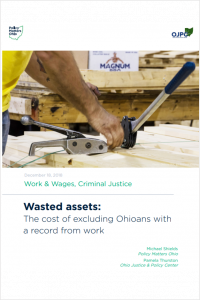Wasted Assets: The Cost of Excluding Ohioans with a Record from Work
Michael Shields & Pamela Thurston, Policy Matters Ohio & Ohio Justice & Policy Center
As this report discusses, the consequences of a criminal conviction extend far beyond the sentence imposed in court. Once-convicted, the authors contend, Ohioans face legal restrictions—called collateral sanctions—that can block access to housing, civic rights and jobs. As explored in this paper, Ohio’s expansive collateral sanctions limit access to more than one in four jobs statewide, cost individuals an estimated $3.4 billion in foregone wages in 2017, and artificially constrain access to talent for businesses. Unchecked, the consequences to people and businesses will only grow. With increased criminalization in recent decades, an estimated one in 11 adult Ohioans is living with a felony conviction and as many as one in three has a criminal record of some kind.
The authors argue that, used narrowly with best practices, collateral sanctions may help protect public safety and vulnerable populations. However, they continue, limiting economic prospects for Ohioans with convictions may undermine the very safety collateral sanctions were designed to protect. With fewer opportunities for legitimate work, the likelihood of re-offending increases. And the cost of overbroad restrictions for Ohioans with a record is high: for those workers and for employers. This report concludes that decreasing the economic cost of collateral sanctions calls for action on several fronts.
